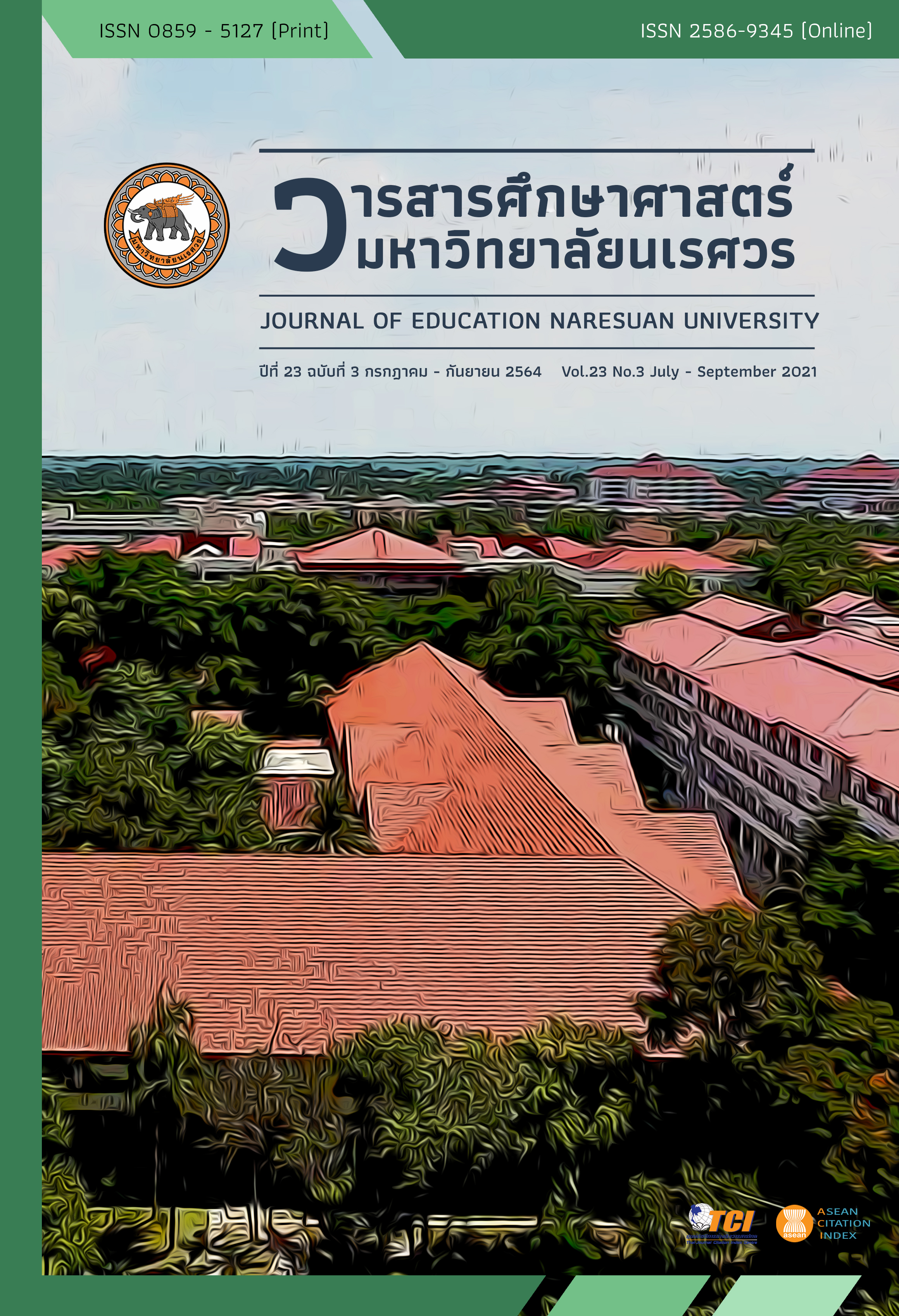DEVELOPMENT OF COMPUTATIONAL THINKING SKILL THROUGH 5ES INQUIRY LEARNING ACTIVITIES WITH BOARD GAME AND FORMULA CODING ON THE POPULATION IN PANDEMIC FOR GRADE 12 STUDENTS การพัฒนาทักษะการคิดเชิงคำนวณด้วยกิจกรรมการเรียนรู้สืบเสาะแบบ 5Es ร่วมกับบอร์ดเกมและการเขียน Formula Coding เรื่อง ประชากร ในสถานการณ์โรคระบาด สำหรับนักเรียนชั้นมัธยมศึกษาปีที่ 6
Main Article Content
Abstract
Effecting of pandemic on population, students’ computational thinking (CT) skills is necessary for using data and news stories to solve and prevent the pandemic problems. This action research purposed to investigate how to use 5Es inquiry learning activities with board game and formula coding approach to develop students’ CT skills of grade 12 students on topic of population and to examine students’ CT skills after learning by this approach. The data was collected from learning activity plans which using COVID-19 pandemic, reflective learning tools, the CT skills test, and student worksheets. Data was analyzed by using content analysis and using resource and method triangulation for credibility of data. The results show that 5Es inquiry learning activities with board game and formula coding approach should start with engagement pandemic news, exploration of pandemic data to design the prevention and solving by using formula coding with Microsoft Excel program, explanation population graphs from changed trend, elaboration of population dynamics illustrated by Covidea board game before group discussion for concluding. In addition, the results of during the activities and the CT skills test show that students’ CT skills are accordant at the highest level.
Article Details
The owner of the article does not copy or violate any of its copyright. If any copyright infringement occurs or prosecution, in any case, the Editorial Board is not involved in all the rights to the owner of the article to be performed.
References
Barefoot, C. A. S. (2014). Computational thinking. Retrieved June 7, 2020, from https://barefootcas.org.uk/wpcontent/uploads/2014/10/Computational-thinking-Barefoot-Computing.pdf
Catete, V., Mott, B., Boyer, K., Lytle, N., Dong, Y., Boulden, D., Akram, B., Houchins, J., Barnes, T., Wiebe, E., & Lester, J. (2018). Infusing computational thinking into middle grade science classrooms: Lessons learned. In the 13th Workshop in Primary and Secondary Computing Education (pp. 1-6). 10.1145/3265757.3265778.
Khasyystillah, I., & Osman, K. (2019). The development of CT-S learning module on the linear motion topic to promote computational thinking. Journal of Education Sciences, 3(3), 270-280. http://dx.doi.org/10.31258/jes.3.3.p.270-280
Kijkuakul, S. (2015). Science learning management: Direction for teachers in the 21st century. Phetchaboon: Juldis. [in Thai]
Kuo, W. & Hsu, T. (2019). Learning computational thinking without a computer: How computational participation happens in a computational thinking board game. The Asia-Pacific Education Researcher, 29(1), 67-83.
Ladachart, L., & Yuenyoung C. (2016). What science teacher should learn from national assessment. Parichart Journal, Thaksin University, 28(2), 108-137. [in Thai]
Lane, P., & Gobet, F. (2012). CHREST models of implicit learning and board game interpretation. In Unknown Conference (pp. 148-157). Springer Berlin Heidelberg. doi:10.1007/978-3-642-35506-6_16
Lee, S., Lee, M., & Park, Y. (2019). A study on an educational model for computational thinking development with excel program. Journal of Digital Contents Society, 20(1). 65-74.
Matsumoto, P., & Cao, J. (2017). The development of computational thinking in a high school chemistry course. Journal of Chemical Education, 94(9), 1217–1224. DOI:10.1021/acs.jchemed.6b00973
Naboonmee, P., Bongkotphet, T., & Thountom, S. (2019). Problem-based learning for developing collaborative problem solving competency in rotational motion topic for grade 10th students. Journal of Education, Mahasarakham University, 13(2), 193-205. [in Thai]
Office of the Basic Education Commission. (2017). Thai characteristics in the 21st century. OEC Journal, 15(145), 25. [in Thai]
Panghom, R., Srisanyong, S., & Teeravanitrakul, S. (2016). Construction of learning packages using a problem-based approach relating geographical phenomena for matthayomsuksa IV students. Journal of Education Naresuan University, 18(4), 278-293. [in Thai]
Peel, A., Sadler, T. D., & Friedrichsen, P. J. (2019). Learning natural selection through computational thinking: Unplugged design of algorithmic explanations. Journal of Research in Science Teaching, 56, 983-1007. DOI: 10.1002/tea.21545
Rosario, B. I. D. (2009). Science, technology, society and environment (STSE) approach in environmental science for conscience students in a local culture. CHED Accredited Research Journal, 6(1), 269-283.
Roungrong, P., Kaewurai, R., Namoungon, S., Changkwanyeun, A., & Tengkew, S. (2018). Computational thinking with Thai education. Panyapiwat Journal, 10(3), 322-330. [in Thai]
Sabkerd, S. (2016). Development of learning activities to enhance computational thinking with focus on STEM educational learning management of the programing and application course for Mathayomsuksa IV students of Anukoolnaree School (Master thesis). Maha Sarakham: Rajabhat Maha Sarakham University. [in Thai]
Taconis, R., Brok, P., & Pilot, A. (2016). Teachers creating context-based learning environments in science. Sense: Rotterdam, Netherland.
The Institute for the Promotion of Teaching Science and Technology. (2018). Basic science course manual science learning subject group (revised edition B.E. 2560) according to the core curriculum of basic education B.E. 2551 (Junior High School). Bangkok: The Institute for the Promotion of Teaching Science and Technology. [in Thai]
Threekunprapa, A., & Yasri, P. (2020). Unplugged coding using flow blocks for promoting computational thinking and programming among secondary school students. International Journal of Instruction, 13(3), 207-222.
Tosuksri, W. (2010). Clinical teaching: Questioning. Retrieved May 30, 2018, from http://www.ns.mahidol.ac.th/english/th/departments/MN/th/km_clinical.html [in Thai]
Wing, J. M. (2006). Computational thinking. Communication of the ACM, 49(3), 33-35.


